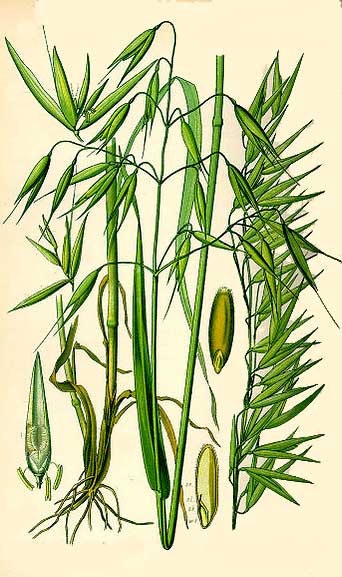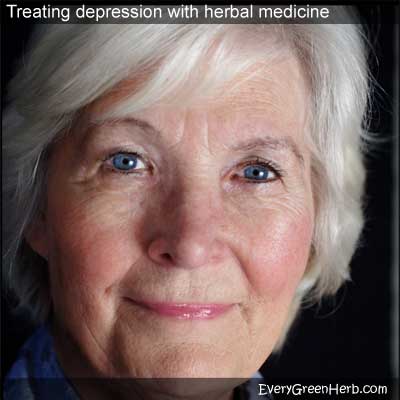Depression herbs and natural remedies
Many herbs can help with depression.

Oats, especially the stalks, show promising results when treating depression. It's easy to get oat straw into your system. You don't have to buy a bale of hay or eat tough grass.
Take oatstraw in extract form for best results. Use oat extract or tincture 3 times a day by putting a few drops on your tongue. Make sure your mouth is clean and wait 10 minutes after brushing your teeth.
Drink oak straw tea if you don't have the tincture. Even eating oatmeal as a cereal can help get rid of depression. Learn more about the healing properties of oats.
Borage, lemon balm, bee balm, and basil are also recommended when treating depression. They can be added to salads or made into herbal tea.
Other herbs to try include ginseng, ginkgo biloba, milk thistle seed, dandelion, rosemary, and mint.
St. John's Wort is a good herb for treating depression.
St. John's Wort (Hypericum Perforatum) is considered by many herbalists to be nature's nerve pill. St. John's Wort helps the body deal with depression by activating secretions of dopamine, the pleasure hormone.
St. John's Wort is uplifting. It is an excellent treatment for depression, anxiety, tension, and nervous conditions. The herb is known to help mood swings and can lift the spirits. St. John’s Wort is also good for chronic conditions where nervous exhaustion is a factor.
There are cautions to consider when using St. John's Wort so do your homework before taking the herb, and never take St. John's Wort while pregnant. St. John's Wort interacts with many prescription medicines so always check to see if it is safe for you to take. Find more about treating depression naturally with St. John's Wort.
Everyone is different.
I probably repeat these three words more than any others. And since everyone is different, please don't give up if one herb or remedy doesn't work for you.
You have started on the path of natural healing, and you body will show you the way if you give it the chance. Keep looking and trying new herbs, natural remedies, and alternative medicines.

Depression, whether mild or severe, can strike at any age.
Chemical imbalances, anger, sickness, grief, and loneliness can cause depression. The elderly and aging populations are especially proned to developing depression. Many become isolated after retirement. Often plans don't work out and older people are forced to live at poverty levels.
Their bodies start to give out, and many senior citizens can't get the right medical care at the right time. Mounds of red tape, filling out paperwork, and online forms become overwhelming.
Grown children might not visit regularly and feelings of disappointment surface. Besides all of that, they have to sit back and watch friends and loved ones die off one by one.
Older people can benefit from herbal teas, but they also need to live a little. If you know older people, try to include them in your life as often as you can. Read about using natural remedies and herbs to age gracefully.
Young people also face depression every day. Stress in the home, bullies on social medial, pressures to achieve at school, and fear of worldwide pandemics cause all types of mental difficulties for our children and teenagers. Young minds need nurturing environments to develop properly, but peace and tranquility is hard to find in today's world.
Middle aged people also suffer with rising rates of depression. Money problems, divorce rates, environmental concerns, health issues, and political unrest cause untold amounts of grief and depression every day.
Read about treating depression by reducing stress naturally.
Thank God there are natural remedies and herbs that help!

Symptoms of depression can vary widely.
Waking very early, sleeping longer than usual, over eating, under eating, increased use of tobacco, alcohol, or drugs, other self destructive behaviors, pulling out your hair, cutting yourself, biting your fingernails, hair twisting, social withdrawal, negative thinking, difficulty concentrating, irritability, poor digestion with constipation, and loss of sex drive are a few of the most common symptoms of depression. Some are more serious than others!
Other symptoms may be less obvious such as manic episodes, excessive self reproach, guilt, disorientation, memory loss, headache, sweating, heart palpitations, weight loss, weight gain, and thoughts of death or suicide. If you have thoughts of hurting yourself, please seek help before acting.
Read about overcoming addiction with help from herbs.
Depression has many underlying causes.
Personal loss, such as the death of a loved one, bottled up anger, bitterness, childhood traumas, biochemical imbalances, and certain prescription drugs can cause depression.
Other causes include blood sugar problems, food allergies, high copper levels, hypothyroidism, and prolonged stress. If left untreated depression may develop into paranoia or another manic depressive disorder.
Depression is unpredictable. It can become chronic and last for years or suddenly disappear for no apparent reason.
Severe depression with thoughts of suicide requires immediate professional help. Call the National Suicide Prevention Lifeline for more information.

Seasonal Affective Disorder is a form of depression.
One type of depression is the “winter blues” or Seasonal Affective Disorder and is due to insufficient light. Many body functions fail to work properly causing abnormal sleep patterns, anxiety, and moods swings. Bright light treatments usually solve this problem.
One other reminder, insufficient sunlight can cause vitamin D deficiency. This should be checked by a healthcare professional before taking supplements since too much vitamin D can be harmful.
Treating depression with aromatherapy
Essential oils and aromatherapy are especially suited for treating depression. Jasmine essential oil, ylang-ylang essential oil, neroli essential oil, and bergamot essential oil are refreshing and especially suited for lifting dark moods.
Lavender essential oil is multi-purpose and helps bring relaxation or energy depending on need.
A combination of basil essential oil and geranium essential oil or rose essential oil can provide wonderful uplifting effects.
Clary sage essential oil and orange essential oil can also help.
Use full strength in aromatherapy or mix with carrier oil for massage and bath.
If you have been reading my Every Green Herb blog for a while, then you know we grow and sell a variety of herbs, but we also buy a lot, too. Try our favorite herbal suppliers for quality and value.
Use dandelion for the treatment of depression due to anger.
Dandelion is a great herb for treating depression due to suppressed anger and disappointment. Put in one tablespoon of chopped root per cup of boiling water and steep for thirty minutes. Strain and sip 2 or 3 cups a day.
Scientific studies on herbs for depression
Studies show that the number of people using herbal remedies for depression is increasing. Medicinal herbs are safer than prescription drugs. Herbs are well tolerated, fast acting, and have fewer side effects than prescription antidepressants.
Herbs like ginseng and peony are especially useful and are often used in Chinese medicine to treat depression and improve mood. Anxiety and insomnia, two conditions that often occur along with depression, can also be treated with herbs and natural remedies.
The Chinese have used herbs for thousands of years to treat mental problems. Herbs often cited include Hypericum perforatum, crocus sativus, and Lavandula angustifolia. Other herbs especially suited for anxiety include ginkgo biloba, California poppy, Gotu cola, and Kava.
Depression and Ginkgo biloba
In the Orient, extracts of Ginkgo biloba leaves are widely used to treat cognitive disorders. Flavonoids and terpenoids in Ginkgo biloba work to reduce the effects of stress, which helps reduce depression and anxiety. These properties also help delay dementia in the elderly and help reduce tendencies for addiction in people of all ages.
Learn more about the healing properties of Ginkgo biloba.
Chinese have many depression remedies that have been used for centuries. Working to regulate chemicals in the hippocampus and cortical area of the brain, studies show that they are effective and safe.
Many studies are looking at the psychopharmacology of herbs. Data shows that psychotropic activities of plants really do help fight depression and other mental problems. More research is needed but applications look promising.
Treating depression with lifestyle improvements
Exercise is a great way to relieve depression. Sunlight, deep breathing, stretching, and massage can also help. Diet is also important.
Depressed people should avoid cheese, sugar, alcohol, caffeine, artificial sweeteners, and preserved foods. Try to eat as healthy as possible with lots of vegetables, lean meats or legumes (beans), fruits, and whole grains. The more green vegetables the better. Everyone need more natural live enzymes in their diets.
Adding pumpkin seeds, wheat germ, and lecithin granules to the diet may help lessen depression. The addition of vitamin B complex, Vitamin C, folic acid, calcium, magnesium, and potassium is also recommended.

Grapefruit, bananas, and grapes can be found year round in grocery stores. Try to eat a healthy diet when suffering from depression. Good diet can really help.
Herbal pillows
Mild cases of depression can be treated with an herbal pillow. Stuff a small pillow casing with freshly dried rosemary, lavender, California poppies, lemon balm, rose petals, and mint.
Use your herbal pillow in bed and while resting. Put a drop of lavender essential oil on the pillow for added strength.
Depressed people need human interaction.
Depression can sometimes be relieved by getting out and meeting new people. Find a church, take a class, attend community events, do some volunteer work, or find a help group.
Make new friends and contact those people in your life that have fell to the wayside. Reach out for help if you are suffering, and always be kind to others. You never know what they may be going through. Try to remember that lots of people have depression. You are not alone.
If you have friends and relatives that are depressed, visit with them or take them out for coffee. Little things can make a world of difference and they add up. Don't give up, keep on looking for solutions and you will find them.
Treating depression with psychedelic drugs
Research shows that depression and most other mental conditions can be treated with psychedelic drugs such as Psilocybin mushrooms, mescaline, MDMA, and LSD.
Patients report healing that lasts for months with just one therapeutic dose. When symptoms return, the patient receives another dose. All sessions take place in controlled environments with qualified healthcare professionals nearby at all times.
Psychedelic drug use is illegal in most of the United States, but where testing is allowed, results are showing great promise.
Read my blog on herbs for mental health for more information about treating mental health issues with herbs and natural remedies.
*St. John’s Wort may cause sun sensitivity. This herb may cause contact dermatitis in some individuals. St. John’s Wort is toxic in large doses. Avoid St. John’s Wort when taking other anti-depressant drugs. Never use St. John’s Wort during pregnancy.
Do not use essential oils in pregnancy without consulting a healthcare professional. Always consult with a healthcare professional before using any herbal remedies especially if taking Prozac or other prescription drugs, nursing, or if you are pregnant.
Sources:
https://www.ncbi.nlm.nih.gov/pmc/articles/PMC4790408/
https://www.hopkinsmedicine.org/news/newsroom/news-releases/psychedelic
Blessings to you and yours!
Thanks so much for reading my blog. Jan.

*Note - the information on this website has not been evaluated by the Food and Drug Administration.
© 2005-2024 website design and content by Janice Boling